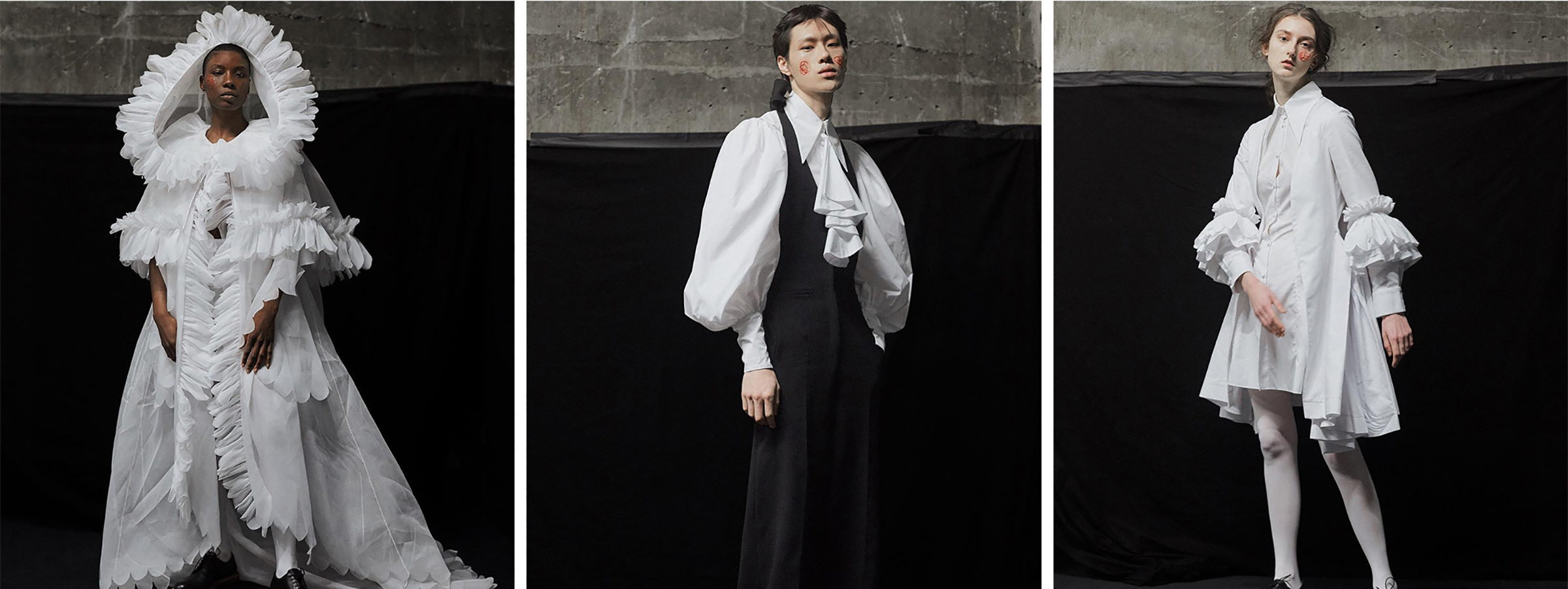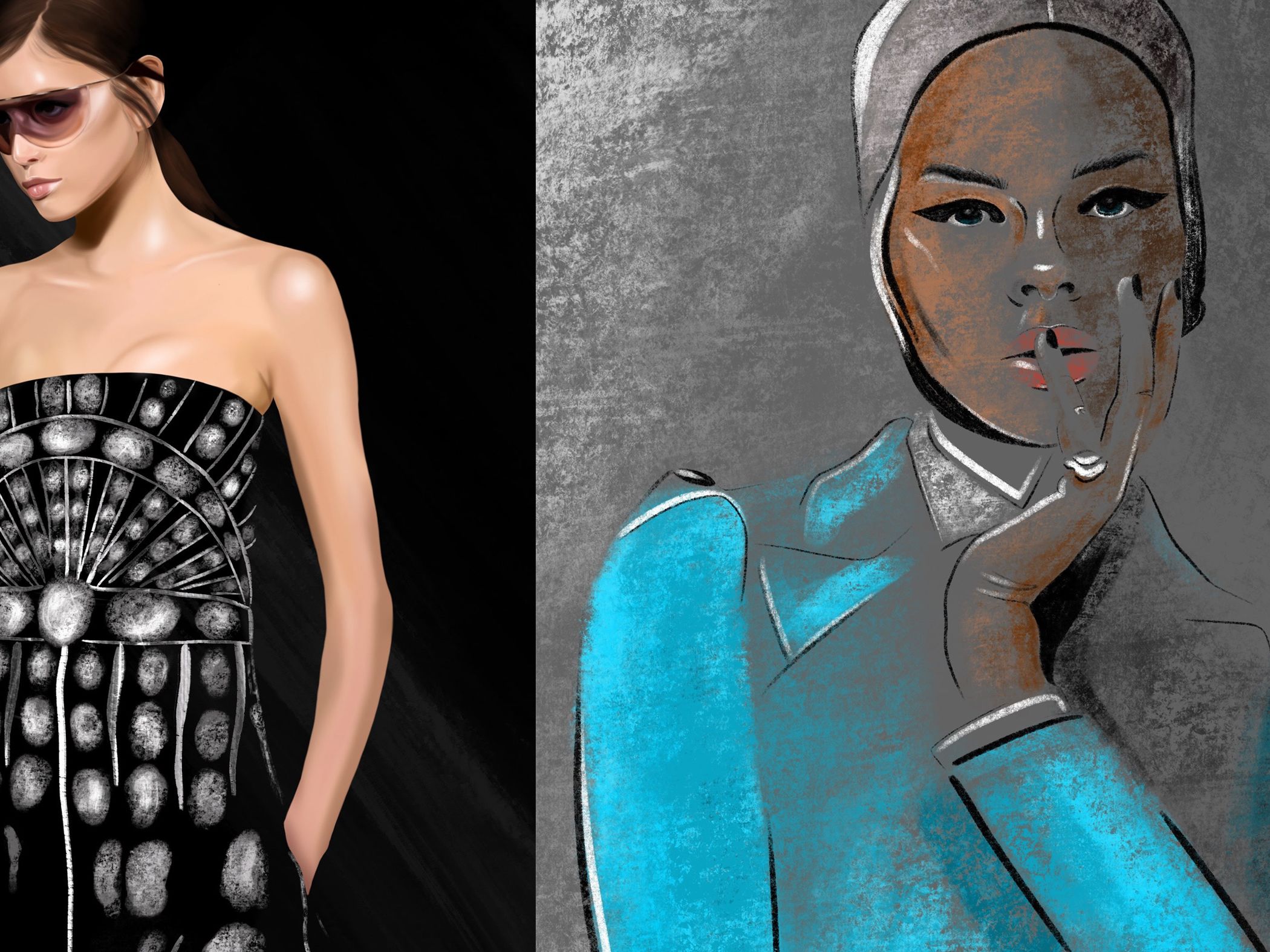LCF has the great pleasure of welcoming Nabil El-Nayal as the new MA Fashion Design and Technology: Womenswear course leader. Nabil is widely experienced in the world of fashion, having completed a PhD in 2018 whilst running a hugely successful fashion label as creative director of NABIL NAYAL. Nabil describes himself as a 'disruptive designer', researching and innovating new ways of reinventing the current fashion landscape. We had a chat with him to hear more about his successful career, and what he's most looking forward to about joining LCF.
You are an academic as well as designer, tell us about your career so far.
I’ve taught on and off since 2012. I graduated from Royal College of Art whilst running my business alongside. We were shortlisted as a business in 2015 for the LVMH Prize which is brilliant.
We worked with Karl Lagerfeld which was absolutely amazing. He bought pieces from my collection which basically put me in the spotlight and was fantastic for my business. They say never meet your idols but they’re all lying, he was amazing.
We launched our business off of the back of that and very quickly grew and became stocked internationally, which we still are. We’re currently stocked in Selfridges. We were nominated again in 2017 for the LVMH Prize and got through the finals and I was introduced to Rihanna which was incredible. We won the BFC’s Fashion Trust 2 years running which basically gives you a substantial pot of money and industry support to grow your business with help of the likes of Vogue. They’re incredible and helped me reach my dreams and visions. The business now has grown to the point whereby we’re doing couture as well as ready to wear. We’re currently showing in showrooms in Paris and apparently we’ve got a new Chinese stockist which is amazing.
Can you tell us about your work?
So my work focuses on European Historical Dress. So it’s looking at 16th century and is very much about the preservation of craftsmanship, looking at ways that people used to construct and make things but also challenging that with future and contemporary technology. I did my PhD all about that, under the title of ‘Disruption.’ It was mainly looking at how I could use historical dress such as smocking techniques, the typical neck ruffle that you would see on Edwardian costume which is an iconic symbol of dress that you would typically see in that age. Combining that with contemporary technologies such as gluing, welding to realise new ways of recreating that. So that was my PhD that I finished last year.


Did you enjoy it?
Oh I absolutely loved it. It was practice based, which meant that my practice was just as important as my writing so it wasn’t just theory. I don’t think I could ever do just a theory based PhD, it would just frustrate me creatively. It’s 3 years, it’s tough. I actually did my PhD back in Manchester, so it’s funny because I originally studied in Manchester, then I went to Royal College of Art and then back to Manchester.
Was that intentional?
So basically, I received the offer to study the PhD when I was in Texas, working on a project doing 3D printing. I was the first designer to have ever used 3D printing on the catwalk which was in 2010. I decided I was interested so I booked in a meeting and found out what they were looking for and thought, this is perfect. So I applied and was successful. So all of that, alongside a business and teaching gives me a kind of multidisciplinary approach to teaching fashion.
You’ve named several skill sets that you’ve gained, what would you say are the significant skills that someone can take away from studying the MA Womenswear course?
My main thing is to not just bring fashion designers out there into the world, it’s to have fashion thinkers. So I want them to really challenge themselves, to research thoroughly.
From doing a PhD I’ve learnt that there are huge benefits of researching your area, you will get a lot out of it. You can use academic context and academic frameworks, research methods and methodologies in a really interesting and creative way. It’s been of huge use to me, and I want my students to leave this course feeling the same way. The combination of being research focused will lead to really exciting and innovative outcomes.
This also gives people a really good platform for when and if they want to go into further education after this, it will help them decide which route to take.
Definitely. That’s exactly the point. Gone are the days where Alexander McQueen’s graduate collection got bought by Isabella Blow. We’re not just sending designers out there to make it big on the catwalk scene, it’s about sending designers out there to look at further research opportunities and to work in and amongst the fashion industry. We have so many students here who go and make huge impacts and huge waves in the industry, but behind the scenes. It’s allowing the students who come onto this course options of where they want to go and allowing for a breadth of creativity. If they want to go and do a PhD that’s great, if they want to go and be a huge star that’s also great. If they want to go and develop in pattern-cutting or garment technology, whatever it may be. Long term, that’s the strategy.

I think that’s what people are looking for in a course, they want to be challenged.
I’m a disruptive designer. My approach is very much about nurturing the unexpected, chance encounters, the accidents and everything else and to do that, you have to be confident about doing that. In order to be confident about doing that, you have to have a very open mind about where you want to go with the collection and the project.
Students do often come onto a course having a very clear vision of where they want to go. My job is to try and compact that and break it down into different elements and attempt to reassemble it into something more exciting than they could have ever imagined. So working with them, nurturing them but also challenging them to start thinking in a more dynamic way.
So, as term has now officially begun, are there any modules that you’re particularly excited about?
Well there are 2. The one that my students are working on right now is a Master’s project where they’re creating a collection. The week is split into two, where we’re doing fittings of their collections with the second years, and the beginning of the week is with the first years, focusing on creative and technical innovation, which is super exciting. They’ve done presentations already about their background, where they’re from, what they do and what they’re about as designers. Already we’re seeing that their research focus is really exciting. It’s quite nice for me as a tutor to be able to see where the creative cycle starts and ends as we’ve got the brand new first year students working with the second year students that are coming to an end.
What would you say you’re most looking forward to about being MA Womenswear course leader?
There is this whole new generation of fashion designers and innovators coming through which is brilliant. I’m proud and excited to be a part of that. It’s important to emphasise that it’s not about becoming a multi-millionaire with a business, but it’s actually about finding ways of working that have meaning, depth and integrity.
There are a lot more designers coming through talking about sustainability, inclusivity and diversity and with thanks to the British Fashion Council and their Positive Fashion initiative, you can see all the designs at those showrooms are all about that. It’s coming through here at LCF as well so I’m still learning, everyone’s still learning and it’s creating an open conversation. I’m being challenged, which is so good.
You talk about sustainability and given the current climate with things such as the climate strike etc, how do you think the new mandatory sustainability module introduced by LCF will affect the nature of the teaching on the course?
I mean, it’s necessary. It has to happen and it’s about time. Talking more broadly about the industry, it needs to be integrating more sustainable aspects into its work and making that the focus. For a long time, I do think that there’s been a sort of prejudice against it because it’s been seen as a bit of ‘oh, if that’s sustainable then you’re using fabrics that aren’t necessarily cool’ but that’s changed hugely. I think that we’re seeing the most amazing innovations of fabrics and the most amazing conversations surrounding the carbon footprint and wider environmental impact that the fashion industry has. Fashion is one of the most polluting industries in the world and so we need to work on making that all second-nature and by introducing the focus the way LCF and UAL have, it’s encouraging it to become ingrained in the whole process.
From my perspective as a designer and from someone who owns a business, we’re working with IBM to uncover transparent business models and how we can introduce ‘block chain technology’ so we can showcase the process. Not just the creative process and how they’re designed but also, where are the fabrics from and where are they farmed? Who’s being paid what and for what thing? What dyes are being used? Where are things produced and manufactured? This allows the consumer the opportunity to track that journey if and when they want to.

Do you think you’ll make it an extra focus in your teaching?
Definitely and it’s already in there. Every single question we ask them during their project are things like ‘okay, so what difference are you making here?’ It’s not just sustainability, it’s also inclusivity and diversity and all the surrounding issues and making sure that people are thinking of these in a very positive and opportunistic way. It’s already ingrained in the way I teach.
Do you have any advice for current of prospective students coming onto the MA Womenswear course? Any tips that you would give to ensure they succeed?
It’s a demanding course as we ask for a lot but they definitely get a lot in return. We ask that they’re very research driven and that they really want to innovate and challenge the fashion landscape and what that means and what it will mean for the next fashion decade. My current collection is SS2020 and would you believe we’re already in the 20s of the year 2000! It’s important to look back at the last 10, 20, 30 years of fashion but also look forward and see how we can use that past experience to shape what’s to come.
I want to encourage students who are really visionary in their through process to think big and confidently about what they really want to contribute to this fashion landscape and make a huge difference.
Personally, how do you envision the fashion landscape to look in 5 to 10 years’ time?
That’s a tough one. If they know what they want to do, they can come onto this course choosing their own specific research areas to ensure that when they leave they know they have the skills to make sure that they can do that particular job really well.

- Find out more about MA Fashion Design Technology Womenswear
- Explore LCF postgraduate courses
- What’s on at LCF: open days and events
- More LCF Stories



